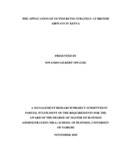| dc.description.abstract | Outsourcing as a contractual agreement between the customer and one or more suppliers to provide services or processes that the customer is currently producing internally is a strategic issue. This allows the company to concentrate on the activities in which it has obtained unique competencies. Upstream and downstream integration with suppliers and customers has emerged as an important part of supply chain strategy. Both outsourcing and supply chain integration have raised critical comments partly due to optimistic presentation both in the academic and practitioner's world. Most of the outsourcing decisions have based on the cost reduction though most firms don't evaluate whether the outsourcing process will be in alignment with the overall organisational goals and objectives.
The purpose of the study was to determine the application of outsourcing strategy on the overall operation of British Airways in Kenya and to establish challenges that have faced the company while implementing the outsourcing strategy and also some of the solutions they have come up with to eliminate these challenges. This study was a case study that involved collection of both primary and secondary data. The primary data was collected through an in -depth interviews with senior managers at BA who are in charge of the departments that have outsourced their services or processes. Content analysis technique was employed to analyze data since its used to analyze interview transcripts to determine the frequency of specific words or ideas.
From the study findings, the researcher concludes that the activities outsourced are noncore to the business such as cleaning services, software upgrades and maintenance, IT services, check-in services, baggage handling, load control, reservations of freight goods, ticketing, office messengers services, payroll services, tax consultant and some core ones such as marketing and public relations. The study also concludes that the critical stages of the company's outsourcing decision were identifying the process or what activity should be outsourced and the continuous management of the outsourcing strategy with the service providers.
The study further concludes that the benefits of outsourcing on the firms' performance are such as cost cutting, risks of failure are minimal in implementing a new system, enhanced efficiency in the operations and the company is gaining from the service providers who bring new ideas and technology through their expertise in their field of operation. The study recommends that although BA has been successful in implementing its outsourcing strategy, the company should continuously monitor its standards and evaluates its SLA's so as to ensure that the suppliers meet them, this is because low standards will negatively affect the company performance. The study also recommends that BA should put in place policies to guide the practice of outsourcing since such policies would emphasize the risks and advantages that could arise from the practice of outsourcing and highlight the importance of contact management. | en_US |

